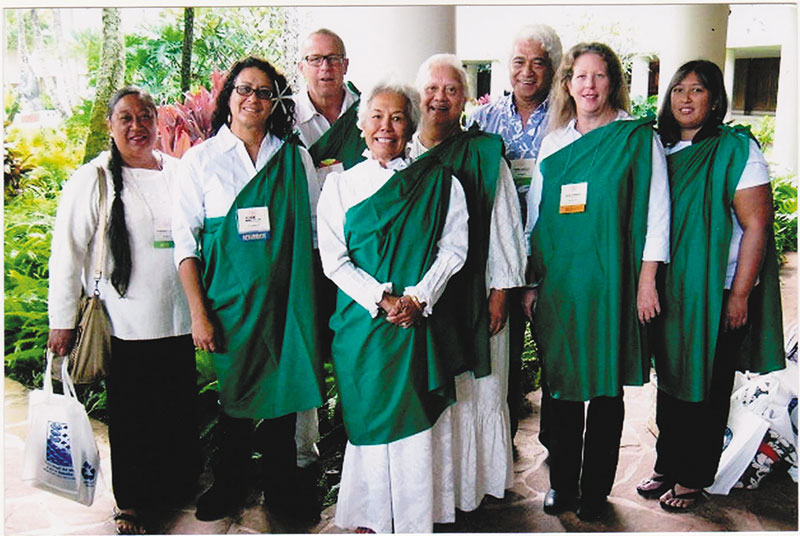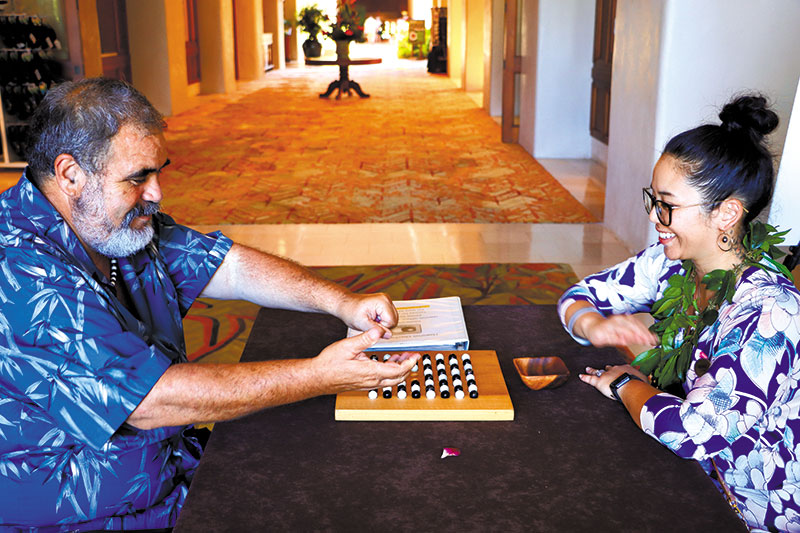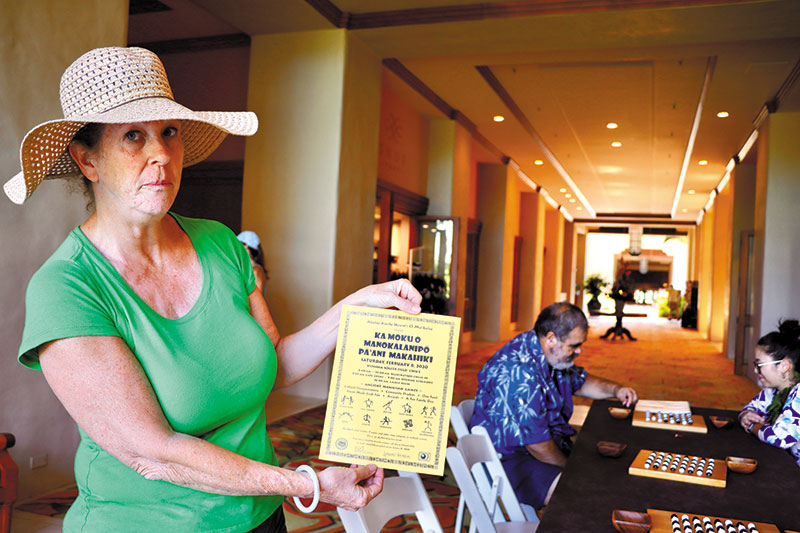Let The Games Begin

Julie Kaneali‘i (second from right) with current and past members of Hawaiian civic club ‘Ahahui Kiwila Hawai‘i O Mo‘ikeha — Manulele Clarke, Ka‘e‘e Ah Loo, Jim Gair, Wini Smith, Ihiihinui Wakinekona, Koko Kaneali’i and Shelby Yokotake — eagerly anticipates the return of this year’s Ka Moku O Manokalanipo Pa‘ani Makahiki. PHOTO COURTESY ‘AHAHUI KIWILA HAWAI‘I O MO‘IKEHA
To the delight of many, Ka Moku O ManokalanipÅ PÄ‘ani Makahiki returns after a two-year break, with organizers eager to perpetuate Hawaiian cultural traditions.
After a two-year absence, Ka Moku O Manokalanipō Pā‘ani Makahiki returns this week, having found a permanent home at Vidinha Soccer Field in Līhu‘e. The event “honors the traditional time of year from November through February when Lono ruled the land.”
While Ka Moku O Manokalanipō Pā‘ani Makahiki may only be five years old, the culturally significant event has been a long time in the making.
Thirty years ago, event organizer Julie Kaneali‘i was working as Parent Community Networking Center coordinator at Hanalei School. In her vast search to bring culturally relevant activities to Kaua‘i’s keiki, Kaneali‘i happened across a video of John Ka‘imikaua and Ka Moloka‘i Makahiki.
Participants of all ages enjoy a variety of cultural activities at previous makahiki games. PHOTOS COURTESY ‘AHAHUI KIWILA HAWAI‘I O MO‘IKEHA
Inspired and energized by Moloka‘i’s successful makahiki, Kaneali‘i determined that Kaua‘i deserved its own makahiki games.
“At that time, Pohaku Nishimitsu was the coordinator for the state Department of Education Hawaiian studies program,” explains Kaneali‘i, “and I talked to him about bringing the games of makahiki to Kaua‘i.”
Their first event was held in 1990 between Hanalei and Kīlauea schools.
“We always hoped to expand it island-wide,” recalls Kaneali‘i, “but I left Hanalei School in 1993, and Pokahu took a different position, and has since passed away.”
“Thankfully,” she adds, “the makahiki games between Hanalei and Kīlauea schools continues today (because) our Pelekikena Naomi Yokotake, a kumu with the DOE Hawaiian studies program, has kept it alive all of these years.”
Yet Kaneali‘i never gave up on that shared dream of taking the makahiki games island-wide.
Then opportunity arrived in 2013 when Hawaiian civic club ‘Ahahui Kīwila Hawai‘i O Mo‘ikeha was officially chartered. As a club member, Kaneali‘i once again found the inspiration she needed to bring the makahiki games to the people of Kaua‘i.
The club to which Kaneali‘i belongs has members from throughout the island and does not represent a specific area.
“We were chartered in 2013, but many of our members have been in the civic club movement all of their lives through their parents,” she says. “It’s a way of life.”
According to Kaneali‘i, the mission of the civic club is to be a positive influence in the community, “through the preservation and perpetuation of Hawaiian cultural traditions in language, environment, history, education, music, dance, and the overall health and welfare of our people.”
For Kaneali‘i, the makahiki represents the very heart of that mission: to educate and perpetuate Hawaiian cultural traditions in a healthy, active and culturally appropriate way.
“It offers the opportunity to connect to cultural traditions that may be lost if they aren’t perpetuated, allowing us to bring it to as many island students and their families as we can,” notes Kaneali‘i.
The club’s first makahiki was held in 2014 in Hanalei, followed by annual events in Kapa‘a, Po‘ipū, and finally in Waimea in 2017. Having taken the event to all four corners of the island, Kaneali‘i felt that it was time to find a permanent home for the event.
“Taking the makahiki around the island was fun, like in ancient times when the konohiki traveled around the island to collect the taxes and trib-
utes that were due to the chief. Once we accomplished that, we decided to find a central location to hold it, making it convenient for people from all over the island to participate,” she explains.
However, the event did not receive funding in 2018, and by the following year, she explains, “we were still putting the club back together after the flood (and) many of our members were directly affected.”
Thus, 2020 offers the opportunity for a fresh start, and Kaneali‘i looks forward to a re-energized return of the Ka Moku O Manokalanipō Pā‘ani Makahiki.

John Kaohelaulii explains konane, or Hawaiian checkers, to a guest at Grand Hyatt Kaua‘i Resort & Spa during last year’s makahiki games. DENNIS FUJIMOTO PHOTO
“Seeing the familiar faces of the kids that come every year, it’s great to see them playing the games, enjoying time with each other and their families. We hope to see a lot of new faces this year,” she adds enthusiastically.
“Makahiki was a such significant time of the year. There (is so much) to learn about the (games), plus all of the traditions that were observed,” says Kaneali‘i.
This year, with the support of OHA, the organization is also offering a talk on makahiki, titled “Protocols and Images” by Umi Kai. Kai is a cultural practitioner from O‘ahu, and will be speaking about the start, procession, images and ho‘okupu of makahiki.
Kaneali‘i is quick to offer gratitude and acknowledge the importance of community involvement.
“It would not be possible to hold this event without the support of Hawai‘i Tourism through the Community Enrichment Program, the County of Kaua‘i, The Garden Island newspaper, Office of Hawaiian Affairs, Hawai‘i Census 2020, and the many volunteers that will be there on the 8th working to register participants and running the games — refereeing and keeping score,” she says.
‘Ahahui Kīwila Hawai‘i O Mo‘ikeha is part of the larger organization, the Association of Hawaiian Civic Clubs that was started in 1918 by Prince Jonah Kūhiō Kalaniana‘ole. Currently, there are 60-plus clubs on the continent and in Hawai‘i.
Besides the makahiki games, ‘A-hahui Kīwila Hawai‘i O Mo‘ikeha also sponsors the popular May Day by the Bay in Hanalei, and they offer a presentation on the life and legacy of Prince Kūhiō at various locations throughout the month of March.












